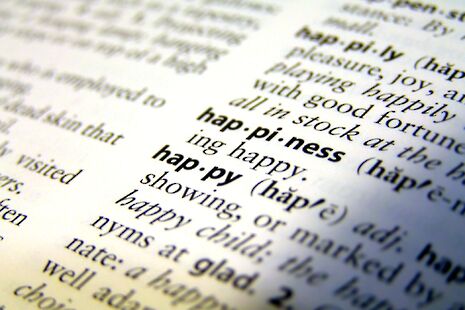‘Don’t worry, be happy’
Columnist Sam Brown explores how a constant preoccupation with being ‘happy’ oversimplifies our notion of wellbeing and can be damaging to our psychologies

What is true happiness?
The perennial question that has forever plagued our race. Philosophers from Confucius through to Nietzsche have grappled with this contentious query, often with less than satisfying results. Unsurprisingly, googling such a phrase leads to more questions than answers. In lieu of a ‘real’ response, internet ‘self-help’ sites simply provide daunting lists of reasons why you should be happy: “Happiness is good for your health,” “Happy people make more money,” “Happiness makes for better relationships.” We live in a society akin to a ‘happiness echo chamber’, with every facet of life telling us that the ideal and ‘mature’ emotional state to aim for is ‘true happiness’. What gets lost in the self-help industry’s message, however, is that happiness is not an attitude that we can regulate and control. As much as Pharrell Williams implores us listeners to “clap along if you feel like a room without a roof,” happiness is not a switch to be flicked on or off.
The pressure to be happy is strongly linked to our ideas about the ideal, mature human being. Our conception of a ‘mature’ person is strongly weighted towards a figure who can generate, control, and repress emotions and attitudes when they want to. In other words, someone who expertly adopts ‘positive psychology’ to maintain a steady state of happiness and contentment is ‘mature’ and ‘has got it together’. This notion has become so pervasive that it is often viewed as socially unacceptable to respond to “How are you?” with anything other than an affirmative “Good, you?”, as if we’re in a constant competition of positivity. However, a growing branch of psychological study, pioneered by the Danish professor Svend Brinkmann from Aalborg University, now argues that this cultural norm need not be so idealised.
Brinkmann has concluded that a constant pressure to be happy has left us emotionally stunted and repressed. “I believe our thoughts and emotions should mirror the world. When something bad happens, we should be allowed to have negative thoughts and feelings about it because that’s how we understand the world,” he argues. A level of emotional turbulence is therefore healthy and enables us to perceive the world in its true colours. Indeed, experiencing a wide range of feelings can help us cope when times are rough. Brinkmann agrees: “Life is wonderful from time to time, but it’s also tragic.”
“It is often viewed as socially unacceptable to respond to “How are you?” with anything other than an affirmative “Good, you?”, as if we’re in a constant competition of positivity.”
However, in some walks of life, acknowledging the emotional turbulence one faces is not encouraged. This is certainly the case in institutions like companies, schools, and universities, who often view worker productivity and academic success as direct corollaries of positivity. The recent Netflix series 13 Reasons Why provides an extreme example of how positivity – and its antitheses, depression and anxiety – can be commodified in educational institutes. The show’s fictional ‘Liberty High School’ and its welfare department adopt a hyper-cynical response to Hannah Baker’s suicide, viewing it primarily as a danger to their public image and reputation. Although the show’s director is clearly exaggerating in order to dramatise their point, this attitude towards student mental health arguably exists in a subtler form in real institutions, with student ‘happiness’ thought to lead to better grades and a more positive public image. By simplifying student welfare into a dichotomy of happy versus unhappy, we perhaps ignore the complexities of mental health issues to our cost.
In the workplace, ‘mandatory happiness’ has become the subject of intense debate. Performance reviews frequently insist on focusing on ‘positive growth’, rather than genuine mental health and stress-related issues. Such reviews can feel near-totalitarian in nature. Indeed, The Lego Movie of 2014 appears to play satirically upon this artificial drive for positivity in its theme song ‘Everything is Awesome’. Although a parody of the workings of a fascist state, its ironically positive line “everything is cool when your part of a team,” resonates clearly with how companies often simplify definitions of happiness to suit their drives for efficiency. The prevalence of the term ‘Human Capital’ in the business world attests to this commodification of emotions.
“Positivity is brilliant, when not mandatory.”
Tied-up with this constant pressure from society, our workplace, and our education system to be happy is our natural retaliation mechanism: irony. Viewing the world through an ironic lens deliberately ignores happiness in favour of a mask of cynicism. Instead of going out clubbing to have fun and genuinely be happy, there’s an ever-growing trend of clubbing for the sake of ironic gesture. Of course, irony doesn’t have to be insincere and negative – it can provide a coping mechanism. Indeed, many, including myself, believe we are moving into that cultural paradise and millennial’s fantasy of the post-ironic age, in which acts of irony become paradoxically sincere and expressions of real emotions.
Emotional range and a natural response to the world is therefore key. Negativity is crucial to fully engaging with and challenging injustice. Having an angry response to Trump’s recent pull-out from the Paris climate change agreement is legitimate – and encouraged. Positivity is brilliant, when not mandatory. Elation upon hearing of Jeremy Corbyn’s guaranteed win next week can only be expected, for instance. On a more serious note, we’re all subjected to this pressure to feel happy and content with life all the time, and this can be daunting. If this pressure becomes too much, I implore you to speak to someone and seek out help. In a world of Brexit, Trump and no David Bowie, it’s ok to feel down sometimes
 News / Eight Cambridge researchers awarded €17m in ERC research grants27 December 2025
News / Eight Cambridge researchers awarded €17m in ERC research grants27 December 2025 News / Downing investigates ‘mysterious’ underground burial vault 29 December 2025
News / Downing investigates ‘mysterious’ underground burial vault 29 December 2025 Lifestyle / Ask Auntie Alice29 December 2025
Lifestyle / Ask Auntie Alice29 December 2025 Sport / Hard work, heartbreak and hope: international gymnast Maddie Marshall’s journey 29 December 2025
Sport / Hard work, heartbreak and hope: international gymnast Maddie Marshall’s journey 29 December 2025 Science / Astronomical events to look out for over the break29 December 2025
Science / Astronomical events to look out for over the break29 December 2025










